-
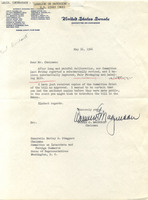 Letter from Senator Magnuson to Congressman Staggers
Letter from Senator Magnuson to Congressman Staggers
-
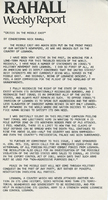 Rahall Weekly Report, “Crisis in the Middle East"
Rahall Weekly Report, “Crisis in the Middle East" In a Weekly Report to constituents, Congressman Rahall explains a resolution he introduced calling for a cease -fire and withdrawal of military troops from Lebanon.
-
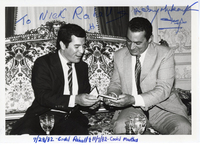 Photograph of Congressman Nick Rahall with Prime Minister Hosni Mubarak
Photograph of Congressman Nick Rahall with Prime Minister Hosni Mubarak Photograph of Congressman Nick Rahall with Prime Minister of Egypt Hosni Mubarak during CODEL Murthel
-
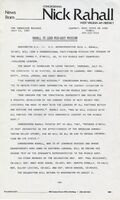 News from Congressman Nick Rahall, “Rahall to Lead Mid-East Mission"
News from Congressman Nick Rahall, “Rahall to Lead Mid-East Mission" In 1982, Congressman Nick Rahall (D-WV) led a congressional fact-finding mission to six Middle East countries, including Lebanon. In a news release, Rahall's office explained the purpose of the mission was to understand the current situation and find a "peaceful resolution of the current siege of West Beirut..."
-
 Senate roll call vote on obstruction of justice charge against President Bill Clinton
Senate roll call vote on obstruction of justice charge against President Bill Clinton Congress may impeach, or formally charge, a federal official who commits a crime or otherwise acts improperly. The House of Representatives votes to impeach, and the Senate then sits as a court to determine guilt or innocence. The House of Representatives has impeached three presidents: Andrew Johnson (1868), Bill Clinton (1998), and Donald Trump (2019). The Senate acquitted all three.
-
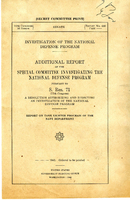 Secret Committee Print, Investigation of the National Defense Program, S. Res. 71, Report on Tank Lighter Program of the Navy Department
Secret Committee Print, Investigation of the National Defense Program, S. Res. 71, Report on Tank Lighter Program of the Navy Department Special, or select, committees are formed to address a specific bill or to investigate anything that is related to the development of public policy. Congressional investigations may provide oversight of the executive or judicial branches, but they have also looked at issues such as Wall Street banking prices, organized crime, and more. In the 1940s, Congress prepared for America’s entry into World War II by appropriating $10 billion in defense contracts. Senator Harry Truman heard stories about contractor mismanagement and conceived of a special Senate Committee to Investigate the National Defense Program. It was one of the most productive investigating committees in history and saved millions of dollars. Senator Harley Kilgore (D-WV) served on the committee, heading up numerous investigations of the scientific and organizational weaknesses in the war effort.
-
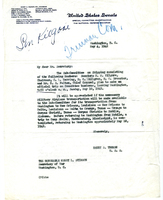 Copy of letter from Senator Harry Truman to Secretary of War Henry Stimson
Copy of letter from Senator Harry Truman to Secretary of War Henry Stimson Special, or select, committees are formed to address a specific bill or to investigate anything that is related to the development of public policy. Congressional investigations may provide oversight of the executive or judicial branches, but they have also looked at issues such as Wall Street banking prices, organized crime, and more. In the 1940s, Congress prepared for America’s entry into World War II by appropriating $10 billion in defense contracts. Senator Harry Truman heard stories about contractor mismanagement and conceived of a special Senate Committee to Investigate the National Defense Program. It was one of the most productive investigating committees in history and saved millions of dollars. Senator Harley Kilgore (D-WV) served on the committee, heading up numerous investigations of the scientific and organizational weaknesses in the war effort.
-
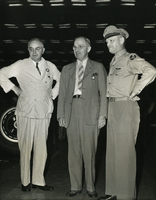 Photograph of Truman Committee’s visit to Consolidated Vultee Aircraft Corporation, Fort Worth, Texas
Photograph of Truman Committee’s visit to Consolidated Vultee Aircraft Corporation, Fort Worth, Texas Special, or select, committees are formed to address a specific bill or to investigate anything that is related to the development of public policy. Congressional investigations may provide oversight of the executive or judicial branches, but they have also looked at issues such as Wall Street banking prices, organized crime, and more. In the 1940s, Congress prepared for America’s entry into World War II by appropriating $10 billion in defense contracts. Senator Harry Truman heard stories about contractor mismanagement and conceived of a special Senate Committee to Investigate the National Defense Program. It was one of the most productive investigating committees in history and saved millions of dollars. Senator Harley Kilgore (D-WV) served on the committee, heading up numerous investigations of the scientific and organizational weaknesses in the war effort.
-
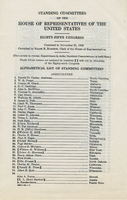 Standing Committees of the House of Representatives of the United States, 85th Congress
Standing Committees of the House of Representatives of the United States, 85th Congress Standing committees are permanent panels established by the standing rules of the Senate or House. These committees specialize in considering legislation of particular subject areas. There are currently 16 standing committees in the Senate and 20 in the House.
-
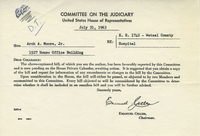 H.R. 1742 referral to U.S. House of Representatives Committee on the Judiciary
H.R. 1742 referral to U.S. House of Representatives Committee on the Judiciary Committee appointments largely determine the areas of legislation in which members of Congress will work and have the most influence. Members must persuade a party’s steering committee to place them on committees that match their own, and their constituents’, interests. Congressman Arch Moore served on the Republican Committee on Committees and received correspondence from members requesting placement on their preferred committees.
-
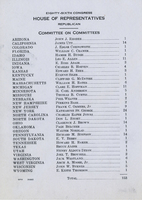 Eighty-sixth Congress House of Representatives Republican Committee on Committees
Eighty-sixth Congress House of Representatives Republican Committee on Committees Committee appointments largely determine the areas of legislation in which members of Congress will work and have the most influence. Members must persuade a party’s steering committee to place them on committees that match their own, and their constituents’, interests. Congressman Arch Moore served on the Republican Committee on Committees and received correspondence from members requesting placement on their preferred committees.
-
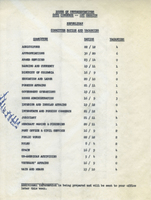 House of Representatives 86th Congress, 1st Session Republican Committee Ratios and Vacancies
House of Representatives 86th Congress, 1st Session Republican Committee Ratios and Vacancies Committee appointments largely determine the areas of legislation in which members of Congress will work and have the most influence. Members must persuade a party’s steering committee to place them on committees that match their own, and their constituents’, interests. Congressman Arch Moore served on the Republican Committee on Committees and received correspondence from members requesting placement on their preferred committees.
-
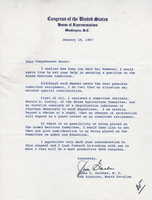 Letter from Representative James C. Gardner to Arch Moore regarding committee placement
Letter from Representative James C. Gardner to Arch Moore regarding committee placement Committee appointments largely determine the areas of legislation in which members of Congress will work and have the most influence. Members must persuade a party’s steering committee to place them on committees that match their own, and their constituents’, interests. Congressman Arch Moore served on the Republican Committee on Committees and received correspondence from members requesting placement on their preferred committees.
-
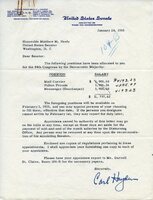 Patronage assignments letter and card
Patronage assignments letter and card Patronage, or the awarding of government jobs on the basis of political ties or favors, was a common practice that started to decline after World War II. The trend in Congress has continued toward permanent, professional, and nonpartisan staff.
-
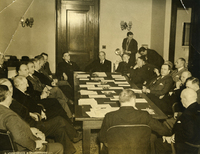 Photograph of the Senate Democratic Steering Committee
Photograph of the Senate Democratic Steering Committee When the Senate convened with a new Democratic majority in 1933, Majority Leader Joe Robinson wanted them to commit to a “binding caucus” rule, meaning that if 2/3 of the caucus supported a proposal, they would vote en bloc. The southerners would not agree, so the caucus (pictured here) was infrequently called together for most of the early New Deal era. Instead, the Democrats created a policy committee to formulate legislative proposals.
-
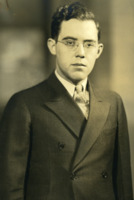 Photograph of Senator Rush Holt
Photograph of Senator Rush Holt Rush Holt was elected to the U.S. Senate in 1934 at the age of 29. He waited six months into the 1935 session, until his 30th birthday, to be sworn in, making him the fourth youngest member in the Senate’s history.
-
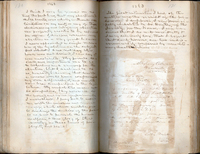 Waitman T. Willey diary entry
Waitman T. Willey diary entry Waitman T. Willey's diary entry regarding his election to the U.S. Senate, 1863 page 130
-
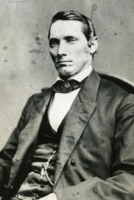 Photograph of Kellion V. Whaley
Photograph of Kellion V. Whaley
-
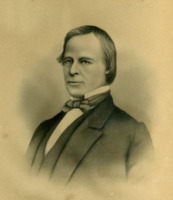 Photograph of William G. Brown
Photograph of William G. Brown
-
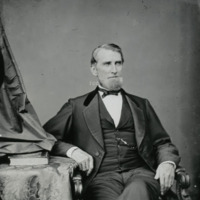 Photograph of Waitman T. Willey
Photograph of Waitman T. Willey
-
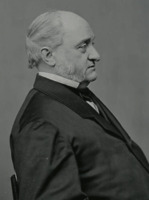 Photograph of Peter Van Winkle
Photograph of Peter Van Winkle
-
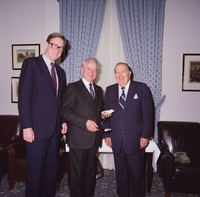 Photograph of Senators Jay Rockefeller, Robert Byrd, and Jennings Randolph
Photograph of Senators Jay Rockefeller, Robert Byrd, and Jennings Randolph Senators Jay Rockefeller, Robert Byrd, and Jennings Randolph at Byrd’s birthday celebration
-
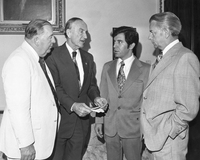 Photograph of Senators Jennings Randolph, Mike Mansfield, Robert Byrd and Representative Nick Rahall
Photograph of Senators Jennings Randolph, Mike Mansfield, Robert Byrd and Representative Nick Rahall Before he was elected to Congress, Nick Rahall worked in the office of then U.S. Senator Robert C. Byrd and as assistant to the Majority Secretary of the Senate.
-
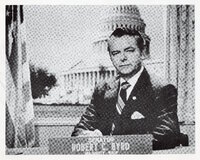 Photograph of Senate Majority Whip Robert C. Byrd
Photograph of Senate Majority Whip Robert C. Byrd Robert C. Byrd holds the record for the longest serving senator in American history (1958-2010).
-
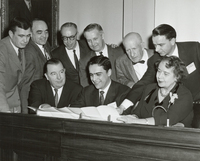 Photograph of the West Virginia congressional delegation
Photograph of the West Virginia congressional delegation Back row, left to right: Representative John Mark Slack Jr., unidentified, Reps. Ken Hechler, Arch Moore, unidentified, Senator Robert C. Byrd; Front row, left to right: Senator Jennings Randolph, WV Governor Cecil Underwood, Rep. Maude Elizabeth Kee
 Letter from Senator Magnuson to Congressman Staggers
Letter from Senator Magnuson to Congressman Staggers  Rahall Weekly Report, “Crisis in the Middle East" In a Weekly Report to constituents, Congressman Rahall explains a resolution he introduced calling for a cease -fire and withdrawal of military troops from Lebanon.
Rahall Weekly Report, “Crisis in the Middle East" In a Weekly Report to constituents, Congressman Rahall explains a resolution he introduced calling for a cease -fire and withdrawal of military troops from Lebanon. Photograph of Congressman Nick Rahall with Prime Minister Hosni Mubarak Photograph of Congressman Nick Rahall with Prime Minister of Egypt Hosni Mubarak during CODEL Murthel
Photograph of Congressman Nick Rahall with Prime Minister Hosni Mubarak Photograph of Congressman Nick Rahall with Prime Minister of Egypt Hosni Mubarak during CODEL Murthel News from Congressman Nick Rahall, “Rahall to Lead Mid-East Mission" In 1982, Congressman Nick Rahall (D-WV) led a congressional fact-finding mission to six Middle East countries, including Lebanon. In a news release, Rahall's office explained the purpose of the mission was to understand the current situation and find a "peaceful resolution of the current siege of West Beirut..."
News from Congressman Nick Rahall, “Rahall to Lead Mid-East Mission" In 1982, Congressman Nick Rahall (D-WV) led a congressional fact-finding mission to six Middle East countries, including Lebanon. In a news release, Rahall's office explained the purpose of the mission was to understand the current situation and find a "peaceful resolution of the current siege of West Beirut..." Senate roll call vote on obstruction of justice charge against President Bill Clinton Congress may impeach, or formally charge, a federal official who commits a crime or otherwise acts improperly. The House of Representatives votes to impeach, and the Senate then sits as a court to determine guilt or innocence. The House of Representatives has impeached three presidents: Andrew Johnson (1868), Bill Clinton (1998), and Donald Trump (2019). The Senate acquitted all three.
Senate roll call vote on obstruction of justice charge against President Bill Clinton Congress may impeach, or formally charge, a federal official who commits a crime or otherwise acts improperly. The House of Representatives votes to impeach, and the Senate then sits as a court to determine guilt or innocence. The House of Representatives has impeached three presidents: Andrew Johnson (1868), Bill Clinton (1998), and Donald Trump (2019). The Senate acquitted all three. Secret Committee Print, Investigation of the National Defense Program, S. Res. 71, Report on Tank Lighter Program of the Navy Department Special, or select, committees are formed to address a specific bill or to investigate anything that is related to the development of public policy. Congressional investigations may provide oversight of the executive or judicial branches, but they have also looked at issues such as Wall Street banking prices, organized crime, and more. In the 1940s, Congress prepared for America’s entry into World War II by appropriating $10 billion in defense contracts. Senator Harry Truman heard stories about contractor mismanagement and conceived of a special Senate Committee to Investigate the National Defense Program. It was one of the most productive investigating committees in history and saved millions of dollars. Senator Harley Kilgore (D-WV) served on the committee, heading up numerous investigations of the scientific and organizational weaknesses in the war effort.
Secret Committee Print, Investigation of the National Defense Program, S. Res. 71, Report on Tank Lighter Program of the Navy Department Special, or select, committees are formed to address a specific bill or to investigate anything that is related to the development of public policy. Congressional investigations may provide oversight of the executive or judicial branches, but they have also looked at issues such as Wall Street banking prices, organized crime, and more. In the 1940s, Congress prepared for America’s entry into World War II by appropriating $10 billion in defense contracts. Senator Harry Truman heard stories about contractor mismanagement and conceived of a special Senate Committee to Investigate the National Defense Program. It was one of the most productive investigating committees in history and saved millions of dollars. Senator Harley Kilgore (D-WV) served on the committee, heading up numerous investigations of the scientific and organizational weaknesses in the war effort. Copy of letter from Senator Harry Truman to Secretary of War Henry Stimson Special, or select, committees are formed to address a specific bill or to investigate anything that is related to the development of public policy. Congressional investigations may provide oversight of the executive or judicial branches, but they have also looked at issues such as Wall Street banking prices, organized crime, and more. In the 1940s, Congress prepared for America’s entry into World War II by appropriating $10 billion in defense contracts. Senator Harry Truman heard stories about contractor mismanagement and conceived of a special Senate Committee to Investigate the National Defense Program. It was one of the most productive investigating committees in history and saved millions of dollars. Senator Harley Kilgore (D-WV) served on the committee, heading up numerous investigations of the scientific and organizational weaknesses in the war effort.
Copy of letter from Senator Harry Truman to Secretary of War Henry Stimson Special, or select, committees are formed to address a specific bill or to investigate anything that is related to the development of public policy. Congressional investigations may provide oversight of the executive or judicial branches, but they have also looked at issues such as Wall Street banking prices, organized crime, and more. In the 1940s, Congress prepared for America’s entry into World War II by appropriating $10 billion in defense contracts. Senator Harry Truman heard stories about contractor mismanagement and conceived of a special Senate Committee to Investigate the National Defense Program. It was one of the most productive investigating committees in history and saved millions of dollars. Senator Harley Kilgore (D-WV) served on the committee, heading up numerous investigations of the scientific and organizational weaknesses in the war effort. Photograph of Truman Committee’s visit to Consolidated Vultee Aircraft Corporation, Fort Worth, Texas Special, or select, committees are formed to address a specific bill or to investigate anything that is related to the development of public policy. Congressional investigations may provide oversight of the executive or judicial branches, but they have also looked at issues such as Wall Street banking prices, organized crime, and more. In the 1940s, Congress prepared for America’s entry into World War II by appropriating $10 billion in defense contracts. Senator Harry Truman heard stories about contractor mismanagement and conceived of a special Senate Committee to Investigate the National Defense Program. It was one of the most productive investigating committees in history and saved millions of dollars. Senator Harley Kilgore (D-WV) served on the committee, heading up numerous investigations of the scientific and organizational weaknesses in the war effort.
Photograph of Truman Committee’s visit to Consolidated Vultee Aircraft Corporation, Fort Worth, Texas Special, or select, committees are formed to address a specific bill or to investigate anything that is related to the development of public policy. Congressional investigations may provide oversight of the executive or judicial branches, but they have also looked at issues such as Wall Street banking prices, organized crime, and more. In the 1940s, Congress prepared for America’s entry into World War II by appropriating $10 billion in defense contracts. Senator Harry Truman heard stories about contractor mismanagement and conceived of a special Senate Committee to Investigate the National Defense Program. It was one of the most productive investigating committees in history and saved millions of dollars. Senator Harley Kilgore (D-WV) served on the committee, heading up numerous investigations of the scientific and organizational weaknesses in the war effort. Standing Committees of the House of Representatives of the United States, 85th Congress Standing committees are permanent panels established by the standing rules of the Senate or House. These committees specialize in considering legislation of particular subject areas. There are currently 16 standing committees in the Senate and 20 in the House.
Standing Committees of the House of Representatives of the United States, 85th Congress Standing committees are permanent panels established by the standing rules of the Senate or House. These committees specialize in considering legislation of particular subject areas. There are currently 16 standing committees in the Senate and 20 in the House. H.R. 1742 referral to U.S. House of Representatives Committee on the Judiciary Committee appointments largely determine the areas of legislation in which members of Congress will work and have the most influence. Members must persuade a party’s steering committee to place them on committees that match their own, and their constituents’, interests. Congressman Arch Moore served on the Republican Committee on Committees and received correspondence from members requesting placement on their preferred committees.
H.R. 1742 referral to U.S. House of Representatives Committee on the Judiciary Committee appointments largely determine the areas of legislation in which members of Congress will work and have the most influence. Members must persuade a party’s steering committee to place them on committees that match their own, and their constituents’, interests. Congressman Arch Moore served on the Republican Committee on Committees and received correspondence from members requesting placement on their preferred committees. Eighty-sixth Congress House of Representatives Republican Committee on Committees Committee appointments largely determine the areas of legislation in which members of Congress will work and have the most influence. Members must persuade a party’s steering committee to place them on committees that match their own, and their constituents’, interests. Congressman Arch Moore served on the Republican Committee on Committees and received correspondence from members requesting placement on their preferred committees.
Eighty-sixth Congress House of Representatives Republican Committee on Committees Committee appointments largely determine the areas of legislation in which members of Congress will work and have the most influence. Members must persuade a party’s steering committee to place them on committees that match their own, and their constituents’, interests. Congressman Arch Moore served on the Republican Committee on Committees and received correspondence from members requesting placement on their preferred committees. House of Representatives 86th Congress, 1st Session Republican Committee Ratios and Vacancies Committee appointments largely determine the areas of legislation in which members of Congress will work and have the most influence. Members must persuade a party’s steering committee to place them on committees that match their own, and their constituents’, interests. Congressman Arch Moore served on the Republican Committee on Committees and received correspondence from members requesting placement on their preferred committees.
House of Representatives 86th Congress, 1st Session Republican Committee Ratios and Vacancies Committee appointments largely determine the areas of legislation in which members of Congress will work and have the most influence. Members must persuade a party’s steering committee to place them on committees that match their own, and their constituents’, interests. Congressman Arch Moore served on the Republican Committee on Committees and received correspondence from members requesting placement on their preferred committees. Letter from Representative James C. Gardner to Arch Moore regarding committee placement Committee appointments largely determine the areas of legislation in which members of Congress will work and have the most influence. Members must persuade a party’s steering committee to place them on committees that match their own, and their constituents’, interests. Congressman Arch Moore served on the Republican Committee on Committees and received correspondence from members requesting placement on their preferred committees.
Letter from Representative James C. Gardner to Arch Moore regarding committee placement Committee appointments largely determine the areas of legislation in which members of Congress will work and have the most influence. Members must persuade a party’s steering committee to place them on committees that match their own, and their constituents’, interests. Congressman Arch Moore served on the Republican Committee on Committees and received correspondence from members requesting placement on their preferred committees. Patronage assignments letter and card Patronage, or the awarding of government jobs on the basis of political ties or favors, was a common practice that started to decline after World War II. The trend in Congress has continued toward permanent, professional, and nonpartisan staff.
Patronage assignments letter and card Patronage, or the awarding of government jobs on the basis of political ties or favors, was a common practice that started to decline after World War II. The trend in Congress has continued toward permanent, professional, and nonpartisan staff. Photograph of the Senate Democratic Steering Committee When the Senate convened with a new Democratic majority in 1933, Majority Leader Joe Robinson wanted them to commit to a “binding caucus” rule, meaning that if 2/3 of the caucus supported a proposal, they would vote en bloc. The southerners would not agree, so the caucus (pictured here) was infrequently called together for most of the early New Deal era. Instead, the Democrats created a policy committee to formulate legislative proposals.
Photograph of the Senate Democratic Steering Committee When the Senate convened with a new Democratic majority in 1933, Majority Leader Joe Robinson wanted them to commit to a “binding caucus” rule, meaning that if 2/3 of the caucus supported a proposal, they would vote en bloc. The southerners would not agree, so the caucus (pictured here) was infrequently called together for most of the early New Deal era. Instead, the Democrats created a policy committee to formulate legislative proposals. Photograph of Senator Rush Holt Rush Holt was elected to the U.S. Senate in 1934 at the age of 29. He waited six months into the 1935 session, until his 30th birthday, to be sworn in, making him the fourth youngest member in the Senate’s history.
Photograph of Senator Rush Holt Rush Holt was elected to the U.S. Senate in 1934 at the age of 29. He waited six months into the 1935 session, until his 30th birthday, to be sworn in, making him the fourth youngest member in the Senate’s history. Waitman T. Willey diary entry Waitman T. Willey's diary entry regarding his election to the U.S. Senate, 1863 page 130
Waitman T. Willey diary entry Waitman T. Willey's diary entry regarding his election to the U.S. Senate, 1863 page 130 Photograph of Kellion V. Whaley
Photograph of Kellion V. Whaley  Photograph of William G. Brown
Photograph of William G. Brown  Photograph of Waitman T. Willey
Photograph of Waitman T. Willey  Photograph of Peter Van Winkle
Photograph of Peter Van Winkle  Photograph of Senators Jay Rockefeller, Robert Byrd, and Jennings Randolph Senators Jay Rockefeller, Robert Byrd, and Jennings Randolph at Byrd’s birthday celebration
Photograph of Senators Jay Rockefeller, Robert Byrd, and Jennings Randolph Senators Jay Rockefeller, Robert Byrd, and Jennings Randolph at Byrd’s birthday celebration Photograph of Senators Jennings Randolph, Mike Mansfield, Robert Byrd and Representative Nick Rahall Before he was elected to Congress, Nick Rahall worked in the office of then U.S. Senator Robert C. Byrd and as assistant to the Majority Secretary of the Senate.
Photograph of Senators Jennings Randolph, Mike Mansfield, Robert Byrd and Representative Nick Rahall Before he was elected to Congress, Nick Rahall worked in the office of then U.S. Senator Robert C. Byrd and as assistant to the Majority Secretary of the Senate. Photograph of Senate Majority Whip Robert C. Byrd Robert C. Byrd holds the record for the longest serving senator in American history (1958-2010).
Photograph of Senate Majority Whip Robert C. Byrd Robert C. Byrd holds the record for the longest serving senator in American history (1958-2010). Photograph of the West Virginia congressional delegation Back row, left to right: Representative John Mark Slack Jr., unidentified, Reps. Ken Hechler, Arch Moore, unidentified, Senator Robert C. Byrd; Front row, left to right: Senator Jennings Randolph, WV Governor Cecil Underwood, Rep. Maude Elizabeth Kee
Photograph of the West Virginia congressional delegation Back row, left to right: Representative John Mark Slack Jr., unidentified, Reps. Ken Hechler, Arch Moore, unidentified, Senator Robert C. Byrd; Front row, left to right: Senator Jennings Randolph, WV Governor Cecil Underwood, Rep. Maude Elizabeth Kee